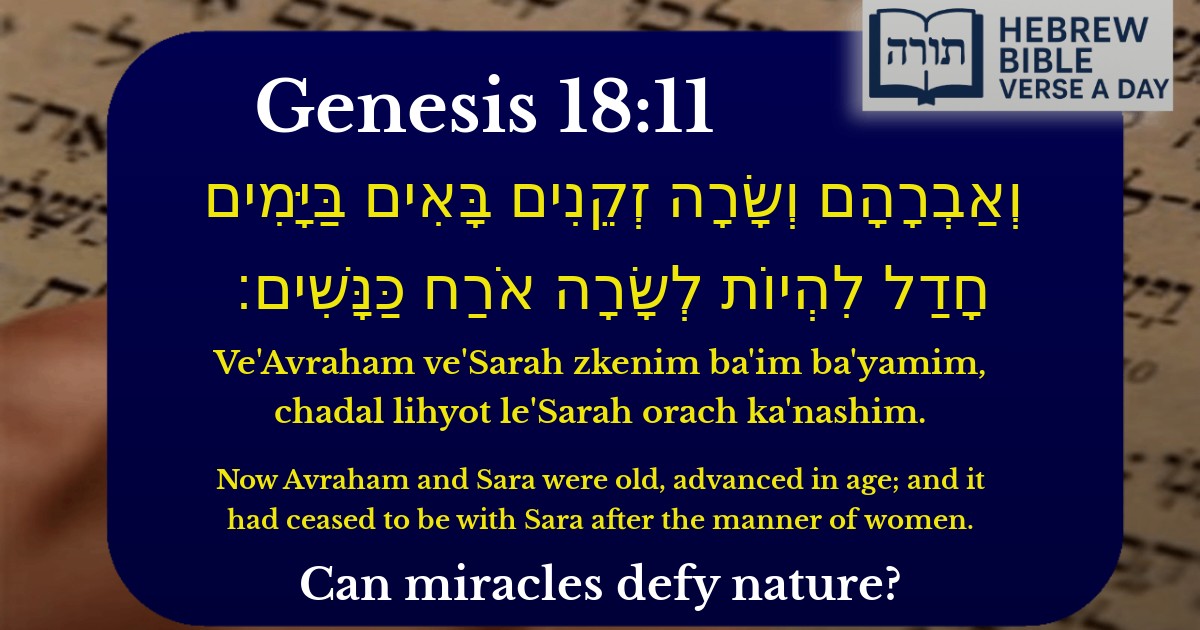Join Our Newsletter To Be Informed When New Videos Are Posted
Join the thousands of fellow Studends who rely on our videos to learn how to read the bible in Hebrew for free!
Hebrew Text
וְאַבְרָהָם וְשָׂרָה זְקֵנִים בָּאִים בַּיָּמִים חָדַל לִהְיוֹת לְשָׂרָה אֹרַח כַּנָּשִׁים׃
English Translation
Now Avraham and Sara were old, advanced in age; and it had ceased to be with Sara after the manner of women.
Transliteration
Ve'Avraham ve'Sarah zkenim ba'im ba'yamim, chadal lihyot le'Sarah orach ka'nashim.
Hebrew Leining Text
וְאַבְרָהָ֤ם וְשָׂרָה֙ זְקֵנִ֔ים בָּאִ֖ים בַּיָּמִ֑ים חָדַל֙ לִהְי֣וֹת לְשָׂרָ֔ה אֹ֖רַח כַּנָּשִֽׁים׃
וְאַבְרָהָ֤ם וְשָׂרָה֙ זְקֵנִ֔ים בָּאִ֖ים בַּיָּמִ֑ים חָדַל֙ לִהְי֣וֹת לְשָׂרָ֔ה אֹ֖רַח כַּנָּשִֽׁים׃
🎵 Listen to leining
Parasha Commentary
📚 Talmud Citations
This verse is quoted in the Talmud.
📖 Bava Batra 58a
The verse is referenced in a discussion about the miraculous rejuvenation of Sarah, emphasizing that she regained her youthfulness despite her advanced age.
📖 Sanhedrin 107a
The verse is mentioned in the context of discussing the merits of Abraham and Sarah, highlighting their old age and Sarah's miraculous conception.


The Advanced Age of Avraham and Sarah
The verse (Bereishit 18:11) describes Avraham and Sarah as זְקֵנִים בָּאִים בַּיָּמִים ("old, advanced in age"). Rashi explains that the phrase בָּאִים בַּיָּמִים implies that they had reached a fullness of years—their days were complete and filled with righteousness. The Midrash (Bereishit Rabbah 58:1) elaborates that their aging was a sign of divine favor, as they had merited to retain their vitality and spiritual greatness even in old age.
Sarah's Cessation of the "Manner of Women"
The verse states that חָדַל לִהְיוֹת לְשָׂרָה אֹרַח כַּנָּשִׁים ("it had ceased to be with Sarah after the manner of women"). Rashi clarifies that this refers to Sarah no longer experiencing menstruation, indicating she was past childbearing age. The Ramban adds that this emphasizes the miraculous nature of Yitzchak's birth, as Sarah was naturally incapable of conceiving at her advanced age.
Spiritual Significance of Their Age
The Sforno teaches that Avraham and Sarah's advanced age was a testament to their unwavering faith. Despite natural limitations, they trusted in Hashem's promise of offspring. The Or HaChaim highlights that their aging process was reversed in certain ways—Sarah regained her youthfulness to bear Yitzchak, demonstrating that divine providence overrides nature for the righteous.